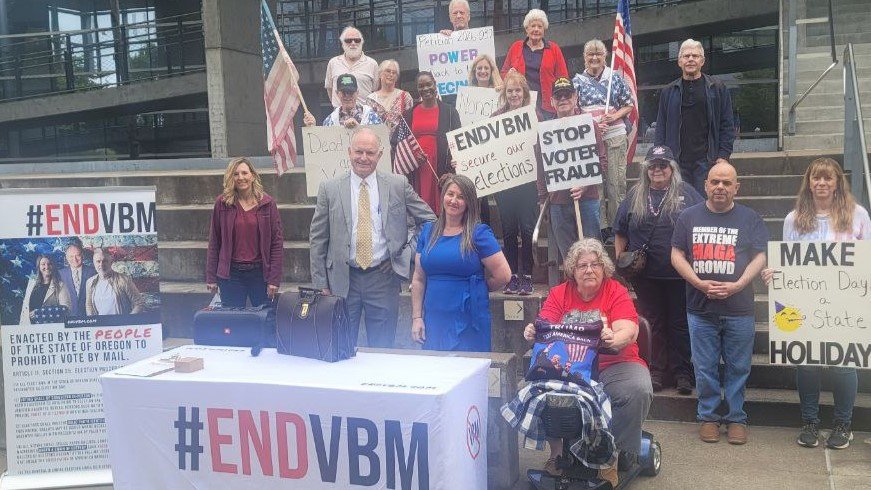Grassroots vs. Gatekeepers: The Real Battle Behind ENDVBM

Rebuttal to “The Fool’s Errand: Why END VBM Will Fail” by Ben Roche
Published on Ben’s Viewpoint Substack
Ben Roche’s critique of the End Vote-By-Mail (ENDVBM) initiative in Oregon misrepresents its leadership, dismisses its grassroots momentum, and overlooks the growing national conversation surrounding election integrity. While Roche’s article attempts to portray ENDVBM as a marginal and misdirected campaign, the reality is that it represents one of the most energized and solution-oriented reform efforts within Oregon’s conservative movement.
This rebuttal clarifies misleading claims, corrects factual errors, and places ENDVBM within its broader political and civic context. Additionally, it explores the political landscape that may inform Roche’s perspective, including observed alignments between establishment Republican circles and Senator David Brock Smith—particularly in Linn County, where grassroots reformers have faced sustained opposition.
1. Mischaracterization of ENDVBM Leadership and Support Base
Roche’s portrayal of ENDVBM as a personal endeavor by Ben Edtl is inaccurate. The initiative is co-led by three chief petitioners:
- Ben Edtl, a public advocate for election transparency;
- Michaela Hammerson, a grassroots organizer from Douglas County and part of the “Roseburg Six,” known for advancing citizen engagement;
- Stephen Joncus, an experienced attorney affiliated with Judicial Watch, who is actively litigating against Oregon for voter roll maintenance failures.
Together, they have built a decentralized leadership structure with over 80 regional volunteer leads and thousands of engaged supporters, many of whom are participating in GOP organizing for the first time.
Rather than diminishing the Republican Party’s relevance, ENDVBM has revitalized it, providing meaningful civic action to volunteers—many of whom are expected to become future Precinct Committee Persons (PCPs).
2. Inaccurate Depiction of Political and Public Support
Roche argues that ENDVBM has no viable pathway to success, citing Oregon’s long history of vote-by-mail. However, this assessment disregards measurable support for the initiative:
- The Deschutes County Republican Party formally endorsed ENDVBM.
- Scott Presler, a nationally recognized grassroots organizer, has amplified the initiative to a broad conservative audience.
- Thousands of signatures have already been collected, and the campaign continues to attract volunteers in all corners of the state.
ENDVBM was strategically launched on November 27, 2024, following national developments signaling that federal policy could limit universal mail-in voting. The ongoing Judicial Watch lawsuit against Oregon, which alleges non-compliance with federal voter list maintenance laws, adds legal weight to the petition’s timing.
3. Oversimplification of Oregon’s Vote-by-Mail System
Roche cites a 2022 poll asserting voter confidence in vote-by-mail. However, confidence is not static, especially in light of:
- Expansions like HB 3291, which allow non-postmarked ballots to be counted if received up to seven days after an election—a provision ENDVBM argues weakens Election Day enforcement;
- Ballot signature verification methods that rely on subjective human judgment or unverifiable machine signature matching;
- A lack of real-time transparency that prevents voters from confirming their vote was counted as cast.
These concerns are not paranoid—they are policy critiques grounded in the belief that transparency and trust are prerequisites for civic engagement.
4. Subtle Alignments with Establishment GOP and Senator David Brock Smith
While the article doesn’t disclose it, Roche’s viewpoint appears aligned with certain establishment factions within the Oregon Republican Party, particularly in Linn County. This region, while not represented by Senator David Brock Smith (who serves Curry, Coos, and parts of Douglas Counties), has become a surprising base of support for him over recent cycles.
Several dynamics suggest a political convergence:
- During her tenure as ORP Vice Chair, Angela Plowhead facilitated relationships between GOP leadership in Linn County and out-of-district figures like Brock Smith.
- Tanner Elliott, Brock Smith’s Legislative Director, currently chairs the Young Republicans of Oregon, which includes active members from Linn County and often echoes establishment priorities.
- Linn County figures have reportedly opposed reformers, including Hammerson and the other members of the “Roseburg Six,” after they backed a primary challenge to Brock Smith in 2024.
While none of this is improper, the alignment is noteworthy because Roche’s critique of ENDVBM mirrors talking points circulated by those same establishment circles who sought to marginalize internal dissent. The article’s framing may therefore reflect political loyalties rather than objective analysis.
5. Misrepresentation of UPTD and Edtl’s Record
Roche criticizes Ben Edtl’s former leadership of the Umpqua Public Transportation District (UPTD), citing financial concerns and alleged election denialism. However, this framing omits critical context:
- Edtl inherited a $1.1 million deficit left by prior management.
- Under his leadership, UPTD began returning to fiscal compliance and restored key funding partnerships, including with ODOT.
- Questions raised about the May 2024 election—where UPTD withheld partial payment pending legal review—were consistent with the type of procedural skepticism ENDVBM advocates, not an act of mismanagement or denial.
To weaponize these disputes as a character attack is not only disingenuous, it distracts from the policy conversation.
6. Momentum, Not Marginalization
ENDVBM is not the only reform effort seeking greater election transparency. It is, however, the most organized and ambitious effort in Oregon to shift elections back toward precinct-based, in-person voting with paper ballots and citizen oversight.
It is precisely this growing movement—fueled by volunteers, not institutions—that has drawn skepticism from some entrenched party figures. But this shift is not a liability; it is a generational opportunity for the Republican Party in Oregon to expand its base and re-engage the electorate.
Conclusion
Ben Roche’s article minimizes ENDVBM’s support, oversimplifies Oregon’s vote-by-mail vulnerabilities, and misrepresents the motives of its leaders. While his critiques align with establishment voices in regions like Linn County that have taken an active interest in protecting status quo figures such as Senator David Brock Smith, ENDVBM represents a diverse, bottom-up response to persistent concerns about voter confidence and transparency.
Far from being a fool’s errand, ENDVBM is a strategically launched, legally supported, and community-driven initiative poised to reshape how Oregonians view elections—and how they participate in them.




